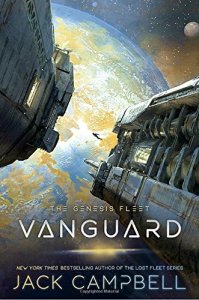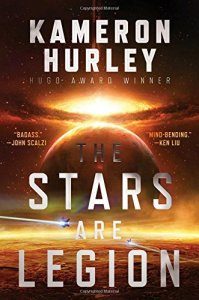Liz Bourke reviews Jack Campbell
Vanguard, Jack Campbell (Ace 978-1101988343, $27.00, 327pp, hc) May 2017.
 Jack Campbell’s long-running The Lost Fleet series (11 novels, soon to be continued in comic form) has already spawned a spin-off in the form of the quartet of books that form The Lost Stars (Tarnished Knight, Perilous Shield, Imperfect Sword, and Shattered Spear). Now he begins a fresh spin-off series, The Genesis Fleet, with Vanguard.
Jack Campbell’s long-running The Lost Fleet series (11 novels, soon to be continued in comic form) has already spawned a spin-off in the form of the quartet of books that form The Lost Stars (Tarnished Knight, Perilous Shield, Imperfect Sword, and Shattered Spear). Now he begins a fresh spin-off series, The Genesis Fleet, with Vanguard.
Vanguard is set at a point in time long before the events of The Lost Fleet. It is clear from the novel’s beginning that Campbell has set out to tell the story of the foundation of the Alliance, the polity to which most of the characters in The Lost Fleet belonged. These are the early days of human expansion across different star systems: the discovery of wormholes and the development of wormhole travel has permitted the ever-more-rapid colonisation of new planets and new parts of space.
Campbell’s approach to the social dynamics of increasing colonisation reminds me vaguely of half-remembered Jerry Pournelle novels I read in my pre-teen years, or the Michael Z. Williamson novel of which I have a faint memory from nigh on 15 years ago: the ‘‘good’’ colonists are trying to escape the ossified bureaucracy (I’d like to see anyone run complex systems without a decently sized bureaucracy) and entrenched time-serving caution of the Old Colonies to start a fresh life, while the bad ones, who are extorting and attacking people left, right, and centre, are generally assumed to be criminals from Mars. (Mars is here categorised as a lawless hellhole, run by vicious gangs and petty tyrants: a simplistic vision of a ‘‘failed’’ state.) Questions of power and privilege are simplified to the very basics. Campbell is not, however, anything like as anti-communitarian as the above-named authors: government bodies here are presented as made up of a mix of people, with their own flaws, and the protagonists are all invested in having functioning governments to look out for the welfare of the people.
Campbell’s not interested in really looking at the logistics or the ecological ethics of expanding human colonisation: adapting Earth lifeforms to different biomes, preserving genetic diversity or the economic rational by which very new colonies have a lot, proportionally speaking, of passing space traffic. He’s primarily interested in getting to the action.
There are four viewpoint characters in Vanguard. Robert Geary is a former Naval lieutenant who joined the new colony of Glenlyon because he felt stifled in his previous role. Mele Darcy is a former Marine sergeant who was encouraged to leave her previous career because when she got bored, she made trouble. Carmen Ochoa is a former Earth conflict resolution specialist, originally from Mars, who wants to prevent the kind of conflict she’s seen on Earth from wracking the new colonies. And Lochan Nakamura is a former politician who believes himself a failure, and wants a fresh start unburdened by the past.
Rob Geary is pressed into service when Glenlyon is threatened by a warship from Scatha, demanding ‘‘protection’’ money. He has to lead what space-based forces Glenlyon can scare up, capture a warship, and defend his new home – while denied any permanent official standing by his government.
Darcy and Lochan meet when stranded on a space station whose authorities are colluding in an extortion racket. Between them, Darcy and Lochan manage to rescue their fellow passengers from being sold off as forced labour, and hold out until another spaceship can pick them up. Aboard that spaceship is Carmen Ochoa, on her way to the somewhat more established colony of Kosatka. Lochan and Carmen strike up a friendship, and eventually a professional partnership aimed at resolving incipient conflicts in the region of space. Meanwhile, Darcy continues on to Glenlyon, where she arrives just as the government there is faced with a need for someone who knows how ground combat works – Scatha has dropped an illegal civilian colony near Glenlyon’s first settlement, but the civilian colony comes complete with troops in battle armour and ground-to-orbit weaponry, and no one on Glenlyon believes than Scatha will stop short of Glenlyon’s complete subjugation.
While the narrative strands of Darcy on the ground and Rob in space parallel each other and work together, Lochan and Carmen do not tie in to any significant dramatic conclusion. This reader therefore concludes that Campbell is a) not great at writing narratives that stand alone and b) is definitely setting up another series after the previous model.
When it comes to storytelling, Campbell isn’t getting any more imaginative. On the other hand, Vanguard shows a little improvement in characterisation: while no one has anything that you could really describe as an emotional arc (or character growth), there’s a greater variety of character types here, and I hold out hope that someday Campbell will demonstrate a consistent ability to write three-dimensional characters.
Honestly, at this point, no one reads a Campbell novel for anything other than the space/battle-action. So where does Vanguard fall on the action spectrum?
It’s not as full of fleet action as Campbell’s previous series. Three is the largest number of ships in combat at any one time – and one of those ships is a transport. But it has a fair amount of daring escapades, boarding actions, ground combat, and Carmen Ochoa foiling an assassin attempt by the badass skills learned during her (dramatically awful Martian) youth. All in all, Vanguard might be light on the literary merits (and thematically slight), but it is entertainingly full of explosions. If you enjoyed his previous work, you’ll like this one, too.








